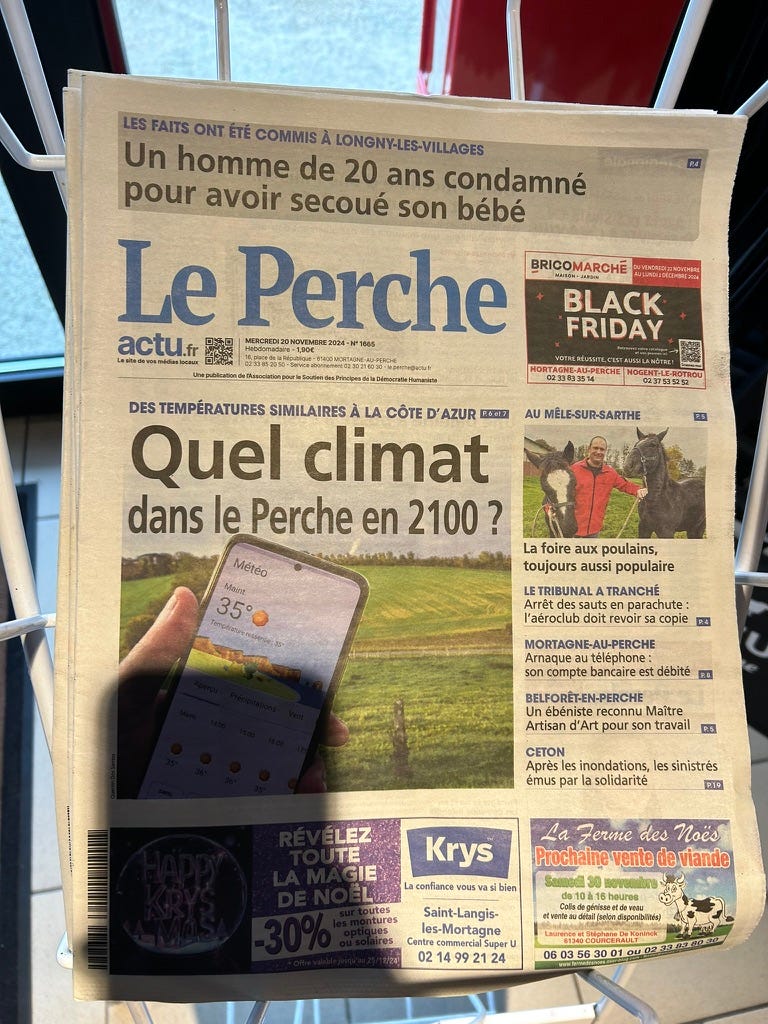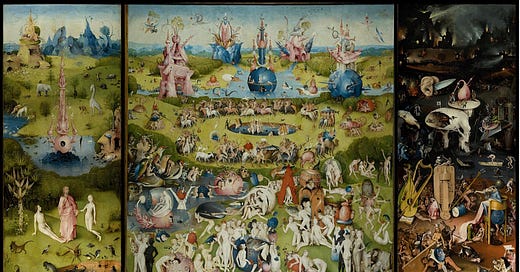
The night of the election, I texted the subject of my next ghostwriting project. “I’m speechless,” I said.
“Why?” they wrote back.
A critical mass of us volunteered to decelerate progress and lean into cronyism and brutality, knowing what we knew? I couldn’t stomach it, but then I was invested in the idea of rational self-interest. This was a particular problem of mine.
What follows is not a rehash of the election (I promise), but a short chronicle of trying to recover from that problem, to try on a skeptical approach to belief, and hopefully go beyond it. If this sounds contradictory, welcome to topsy-turvy. It’s all contradiction from here on out, baby.
If you, too, have been feeling like you’re in a hall of mirrors where once everything seemed solid, maybe you’ll relate to what follows. Maybe you’ll have a different version that you want to pipe up about in the comments. If all we have is each other, then it’s a good time to compare notes. As always, I welcome your perspective.
Systems collapse does not tickle my pickle. Even as mainstream information architecture started crumbling years ago, threatening (what never actually was) consensus reality, I, a higher-educated white person without any major mental illnesses or disabilities other than being a woman, spent almost twenty low-risk years opining cleverly on perfume and restaurants and cities and people. I was good to the establishment, and it was good to me. I bought a house off it.
But why did I think the ground was so firm under our feet? Or that the rules were clear and agreed-upon before “the Trumpocene” era, as coined by Jeff Sharlet? I should have known better, at least intellectually, having spent my academic years mainlining Post-Structuralism and Cultural Studies. Those currents of thought taught me ways to pick apart received narratives to find their inherent contradictions and unacknowledged power relations. Enlightenment rationality was one of my mentors’ favorite villains. But then I moved on from my mentors like we all do.
The Age of Reason—which we can roughly date from the end of the 17th century to the middle of the 19th—gave us a nobler and wiser way to enter public space, as equal citizens with rights rather than subjects under force. This was an improvement. A Western world eager to transcend superstition and disease welcomed the notion of superior, neutral data, and wise choices motivated by the greater good. And the wealth funding all that science and philosophy was accumulated through mass murder, human traffic and forced labor.
As the great revolutions of the mid-19th century broke up empires, fueled by the clean thoughts and orderly systems of the well-meaning, the cotton gin was invented. Here was a technological innovation that made the slave trade go into overdrive. Does a Greek pediment still express harmony like the one atop the White House if it was built by enslaved people? (Then again, does it in Greece? Their classical age of wisdom was also powered by souls in bondage.)
The arc of the moral universe bends toward profit. I have been a journalist as the news dies, and I forgot all of that.
The best explanation I can come up with now is that people with my aesthetics had a long enough grip on epistemological power for me to forget. I had a lot of incentive to forget anyway. My illicit love affair with the Enlightenment happened at about the time that I started to earn decent money at being a professional person telling readers about how things are. I got paid to ditch relativism, gut instinct, charisma, bedazzlement and vibes, but I didn’t need to blind myself to their power to run the world.

It came from a wounded place as does every dumb thing I do. Twenty years ago I told my psychoanalyst that I wished I could just be a laser beam: out of body, full of clarity and true aim and brilliance. So much easier than contradictory flesh and nonlinear unmet desire. I wanted the ease of disembodiment and good ideas because I could never really master anything else. I didn’t have the great love affair that made wooziness feel rewarding, like something I wanted to surf. I had insecurity. I couldn’t harness the chaos of my own imagination or feel comfortable in its boundless anarchy to produce any proper works of art. I was never willing to grift off what charisma I do have. I hate being on camera. And I have daddy issues. I needed to submit to a higher order.
This even extends to my woo-woo leanings. About halfway into election season, I got frustrated with how the New York Times and Washington Post were framing things. I realized that legacy media was normalizing an aberrant force and playing with my dopamine, and I was mad at how it ignored Trump’s brain while asking too many questions about Joe Biden’s. He was my ultimate ideal dad, the spokesmodel for everything that was gentlemanly and good. I couldn’t bear seeing him get the Red Wedding treatment.
Heartbroken, I went wandering through the weirder corners of the internet. I stumbled upon political tarot card readers and astrologers and chuckled to myself, “These people are every bit as justified in their perspective as professional pundits.” I stuck around that corner of the virtual Star Wars Bar because they were all sure, like I was, that MVP would win and order would prevail, so even as their dippiness and cosmic certainty was funny to me, as they interrupted their flow to proclaim their mantra “for entertainment purposes only,” all of it made my brain feel good. (They have to say that so they don’t get sued for prophesying-slash-speculating about the ill deeds and low character of the famous.)
I could see that many of these so-called visionaries were charlatans, or at least working entirely off their priors. (And hearing them all come up with excuses for having gotten it wrong since November 6 is pure comedy. A favorite theory is, “We switched timelines.”) I wasn’t ever taking them purely literally, I promise you. But I needed more big systems to assuage my anxiety over current events. Planetary cycles as interpreted by humans, something I learned about at my father’s knee, seemed like an OK compromise.
Astrology is the most Cartesian of the New Age strands because it’s about actual planets, and history and angles rather than just throwing down some random cards and opening your mouth to see what comes out. Do I “believe” astrology? Sometimes. You could accurately sum up this entire Substack so far as Pluto transiting my 12th house, though you might miss some of the fun.
Have you ever asked yourself why cult documentaries are so popular in the Trumpocene? They’re reassuring entertainment for smart people who enjoy pointing fingers at rubes for falling for charismatic nonsense. Except we all do, over and over again. All of us. I have been inside some of the yoga studios chronicled in the documentary Breath of Fire. They too promised “technology” and cohesion. I wanted to achieve cohesion, even if their yoga was invented by a rapist.
Where I have started to direct my desperate need for order now is simply trying to make straight lines with my body for 30-45 minutes a day while breathing rhythmically. I don’t care about Pantanjali’s Yoga sutras. Maybe he fucked kids too. But if I know anything, I know that my body has lines and angles and curves. I try to inhabit them and think of nothing else other than subtly adjusting myself to them. It is 30-45 minutes of existential comfort, even while sweating and cursing.
You could say all I’m doing in trying to become triangle pose is retreating into Euclid, except even that patron saint of pure thought and order was a mysterious figure about whom little is known. We do know that Plato, a great influence on him, was not an atheist. I also find comfort in that. I am certainly not trying to be a laser beam anymore. I have too many wrinkles now anyway.
The person who coined that beautiful phrase about the arc of the moral universe was never once naïve or intellectually lazy like I was. He took a bullet trying to push that arc into a better shape, and he knew much better than I do that we never really were a system of laws above men. He also spoke in poetry and sermon, and harnessed political force through charisma and faith. He may turn out to be right after all, and all of this panic and confusion is just a hiccup.
Alternately, we may be experiencing the second medieval era, with a steroid-abusing anti-vaxxer helping us to make measles great again. A great piece by Derek Beres reminded me that the first anti-vax movement happened at the very emergence of vaccines. We have always been janky and foolish.
Reason isn’t progress. It’s luxury.
Bulk up and be ready to forge ahead based on other kinds of power, those I once believed to be of lower orders than the mind. Rose colored glasses have gone out of style.
I say this inspired by my new collaborator, whose fierce Amazonian butch energy I find so welcome right now. This is someone I would describe as a radical humanist with an outsider perspective on success. An auto-didact who came up hard in early life, they cut their teeth on influencer culture and bang the drum of popular knowledge alongside institutional. By ancestry and upbringing, they were more subject to brute force than I ever was. They did not have the privilege of my disembodied, neutral-seeming orientation and never felt at home in the self-reinforcing liberal MSNBC cocoon. Unable (and unwilling) to get high on that supply, here is their final contribution to our election night exchange:
“I’m excited.”
About the best I can say right now is, “I’m breathing.” But no matter what, I know that is real.
Let’s go out on a banger.






I love your writing and perspective. I wrote about the election and how it unleashed deep grief / disorientation within me; it might be relatable. I also sometimes find weird "comfort" in the knowledge that humans have historically mostly been terrible, but the terror seems really real / close now. Ugh.